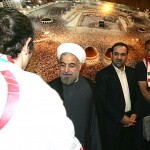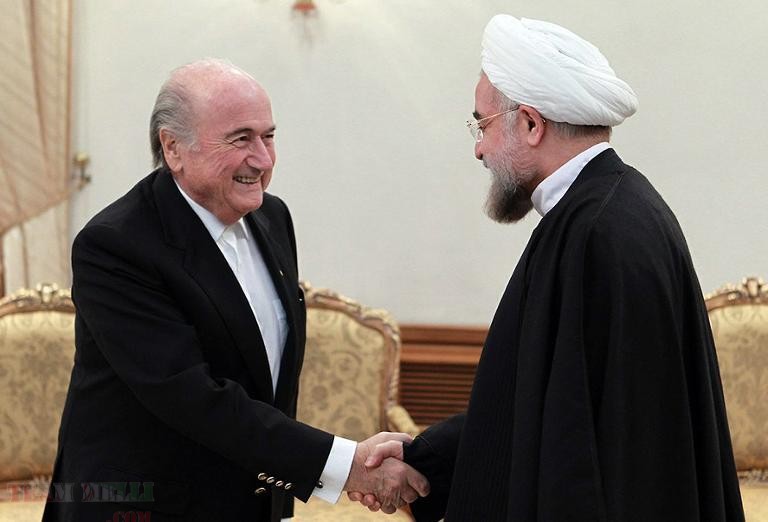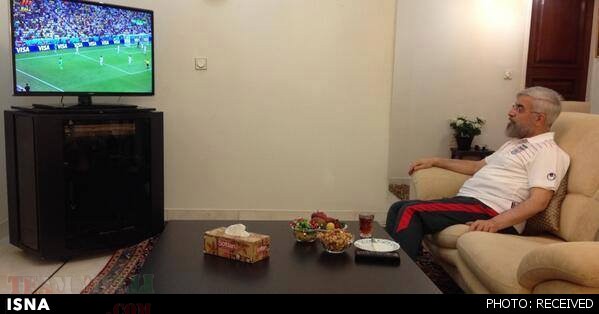Iranian President Hassan Rouhani was re-elected as the country’s leader with 57 percent of the vote on 20th May 2017. The reformer has been able to rely on the support of several well-known sportsmen. In Iran, politics and sports are never far from each other.
With 23.5 million votes, Hassan Rouhani was re-elected to the presidency of Iran on May 20, 2017. While 42 percent of registered voters chose this reformer, the proportion of top-level sportsmen voted for him May have been higher still. With such a young population, the polls were filled with the age group that idolize sportmen and hence their vote were certainly influenced by what their idols backed.
Prior to the poll, Hassan Rouhani had the favors of several retired or active footballers, such as Ali Karimi, Ali Daei, Karim Bagheri, three local legends who played in the German Bundesliga.
The other disciplines cherished in Iran have not been left behind, according to the official website of Rouhani campaign and some sports media. The names of 2012 Olympic champions Behdad Salimi (weightlifting) and Omid Norouzi (Greco-Roman wrestling) featured alongside those of volleyball players and chess players.
Conservative Ebrahim Raisi less sustained
The conservative Ebrahim Raisi, Rouhani’s main rival, apparently could not count on the same support from the country’s sports elites, even though the head of the Iranian Olympic Committee (Kioumars Hashemi) seemed to be on his side, that of course counted for very little.
Sports and religion do not always do well … Besides, since his first victory in 2013, Hassan Rouhani has tried to dissociate power and sport, at least in appearance. In November 2013, after a wave of success, he declared: “If we look at the excellent successes in sports, we do not do much for it. We have only helped to shadow the policy on sports. “
Politics and sports are “intertwined” in Iran
Houchang Chehabi , a professor of international relations and history at Boston University, believes that wishes are more than a reality. Sports and politics ” are undoubtedly interwoven, says the researcher. In the Islamic Republic, all cultural aspects are politicized, including sport. The best example is the career of Faezeh Rafsanjani, the daughter of the late president of Iran [from 1989 to 1997, Editor’s note] Ali Akbar Hashemi Rafsanjani . It has revived the sport of women. “
If politicians are involved in sport, sportsmen and sportsmen also engage in the political life of their country. ”Their involvement goes back to the pre-revolutionary period ,” explains Houchang Chehabi. Even before 1979 revolution, the Olympic champion Gholamreza Takhti, the cult figure and the hero of the underprivileged was known for his supporter of Mohammad Mossadegh [ Prime Minister of the country in the years 1950 , Editor’s note] against the Shah “, recalls the scholar. Another Olympic wrestling champion, Emamali Habibi was placed in Parliament. Since the mid-1990s, athletes have been giving their opinions. The Tehran City Council is full of former sportsmen. “
The place of women in sport, a recurring debate
When debate arises in sport today, it often concerns the place of women on the grounds or in the stands. Females are rarely admitted in mixed enclosures since the Revolution. In February, however, spectators were allowed to attend a beach volleyball tournament as a result of pressure from outside.
Diplomatic considerations also regularly invade land, rings and tatamis. In 1998, as a sign of peace, Iranian footballers had posed with their American opponents just before a World Cup match. Conversely, threats of boycotting confrontations with athletes from Israel or Saudi Arabia sometimes interfere with the image of Iranian sport.
Iranian athletes and teams are the only sportsmen in the world who are officially barred by the country policies and religious pressure to meet Israeli counterparts. Many Iranian have been barred, suspended or thrown out of tournaments for refusing to compete against what the Iranian government label as the Zionist state or the occupier of the holy land, however, such disciplinary and punitive measures have not stopped the Iranians as it continues unabated until today!
At the beginning of the revolution, sportsmen and teams were unashamedly influenced by the regime and the revolutionary fervor spreading through the country. In the eighties Every Iranian team had to display some kind of religious or political banner in support of their leader Khomeini, to the disgust of the rest of the world. However, with the emergence of the Rafsanjani and his political wisdom and pragmatism, these exhibitions of unwelcomed religious and political propaganda all but disappeared.
Note: Part of this report is reproduced from rfi.fr



